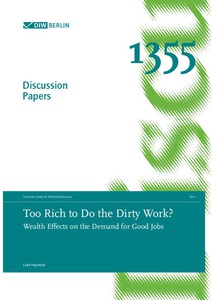Too rich to do the dirty work? Wealth effects on the demand for good jobs
"Jobs offer different wages and different non-monetary working conditions. This paper investigates how the demand for non-monetary aspects evolves over changing wealth levels. Wages do not perfectly compensate individuals for differential utility of jobs in a labour market with informational fr...
| Main Author: | |
|---|---|
| Institution: | ETUI-European Trade Union Institute |
| Format: | TEXT |
| Language: | English |
| Published: |
Berlin
2014
DIW |
| Subjects: | |
| Online Access: | https://www.labourline.org/KENTIKA-19121281124919494639-Too-rich-to-do-the-dirty-work?.htm |
| Summary: | "Jobs offer different wages and different non-monetary working conditions. This paper investigates how the demand for non-monetary aspects evolves over changing wealth levels. Wages do not perfectly compensate individuals for differential utility of jobs in a labour market with informational frictions. Changes in wealth may then affect preferences for different jobs. Willingness to pay for non-monetary aspects of jobs (measured by job satisfaction for work "in itself") is found to increase with wealth shocks. Duration models are estimated based on the reduced form of a search model. Wealth may play an important role in labour market choices." |
|---|---|
| Physical Description: | 43 p. Digital |

